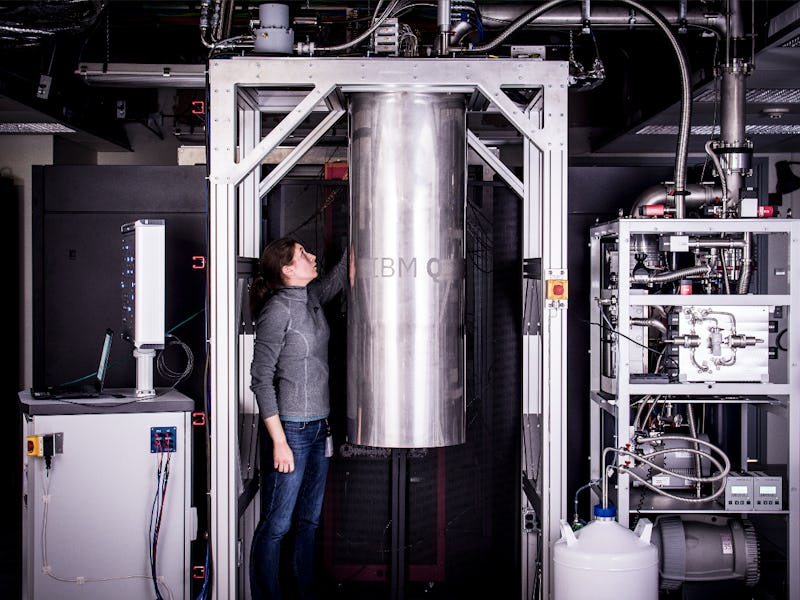IBM Introduces 2 Quantum Processors in Quest for 50 Qubits
This is IBM's most advanced quantum machine

IBM announced Wednesday the release of two new quantum computing processors that the company says will build “the foundation for solving practical problems in business and science that are intractable even with today’s most powerful classical computing systems.”
Quantum computing uses the quantum properties of molecules to build extremely small, super-fast processors that can handle extremely complicated problems. Unsure of how quantum computing works? Be like 5 million other people and watch this video. In a nutshell, quantum mechanics will dramatically increase computing power because we’ll jump beyond the physical limitations of physical microchips. Moore’s Law won’t even matter.
Introduced by IBM were:
- A processor that is 16 qubits for public use via the IBM cloud
- A 17-qubit prototype commercial processor
The first application of these processors is likely to be in chemistry, unlocking new properties of molecules like the caffeine in your coffee. But experts say we might see a quantum video game as a first test of what quantum systems can do.
Although the IBM Q initiative — of which these new processors are part — doesn’t yet have the power of a traditional super-computer, its launch signals the rise of quantum machines, and industries searching for answers classical computers can’t unlock.
“They’re going to see a little bit what happens when people start playing around with the machine,” Jake Taylor, a quantum system expert at the University of Maryland tells Inverse. “And the history of classical computing suggests that when you get smart technical people playing around with machines, the first thing you get is they build a video game.”
An IBM 16 qubit processor that is available for the public to use. The 17 qubit processor is only available commercially.
What’s a Qubit?
A single qubit represents an individual photon of light that can vibrate to make vertical or horizontal waves. It’s kept super-cold so the molecules move slower and are easier to interpret. While normal computer bits are either 1s or 0s, qubits can be both 1 and 0. This quantum state allows quantum computers to query complicated problems faster than classical computers.
“For any company that relies on computing, now is the time to start learning and understanding what is this emerging technology and what applications might have an impact on their business,” Dario Gil, VP of Science and Solutions for IBM Research tells Inverse. Since molecules have this same kind of quantum state, chemistry is a clear first application, says Gil. “In the future, the goal will be to scale to even more complex molecules and try to predict chemical properties with higher precision than possible with classical computers.”
However, although this is IBM’s most advanced quantum machine to be commercially available, and IBM is upgrading its public machine to have a 16 qubit processor, it’s not a machine that can replace a regular computer yet. In part, this is because quantum machines are optimized for complex problems and not classical computing. And since the technology is only in the beginning of development, IBM and other researchers are having to redefine qubits and processing power on the fly.
“The significant engineering improvements announced today will allow IBM to scale future processors to include 50 or more qubits, and demonstrate computational capabilities beyond today’s classical computing systems,” said Arvind Krishna, senior vice president and director of IBM Research and Hybrid Cloud, in a statement.
But that may not be enough qubits.
“I don’t know if the 10-50 qubit range is going to be enough to ignite the type of creativity we saw with the emergence of the microcomputer back in the late ‘60s,” says Taylor. “I’m hopeful, though.” He thinks the 50 qubit range is where quantum machines surpass supercomputers and become truly valuable, a task that Gil says IBM is working to achieve in the next few years.